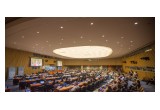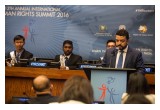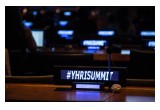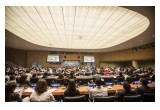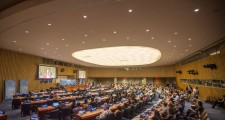
Hosted at the United Nations on August 25-26th, the 13th annual International Human Rights Summit 2016 features young volunteers who are using education to end such human rights violations as human trafficking, police brutality, bullying, poverty, war and gang violence.
The 72 young men and women at the summit are no strangers to human rights abuse, those who have not lived through it personally are no less committed to ending these violations of the Universal Declaration of Human Rights. Which is the very reason they were selected by Youth for Human Rights International as delegates to represent their 41 countries.
“Gangs in Timor were responsible for over 200 deaths each year,” said a youth delegate from Timor-Leste who has been part of the Youth for Human Rights volunteer force that has been educating young people in their country on the Universal Declaration of Human Rights since 2011. “Now many of the over 300,000 young people who have received human rights education are young people who used to be part of these school gangs. These days, those school gangs have changed from being a problem to becoming human rights defenders because of the help of the human rights education program and the volunteers of our team.”
“Our humanity is in peril,” said Rahaf, the youth delegate from Saudi Arabia. “We are being separated/labeled by our religion, race, gender and nationality. Our unity relies on our humanity. It is our duty to teach and carry the Universal Declaration of Human Rights and practice it.”
The Armenian delegate, Mariam, spoke of the “internally displaced persons in Armenia” and the more than 17,000 Syrian refugees that are emigrating to the country. “We must stand up to such hate and ignorance and speak up for those whose voices have been silenced,” she said, “those who are afraid to talk for fear of persecution. We must learn to accept our differences instead of trying to make sure we all fit the same mold.”
They also heard from Augustine Brian, Papua New Guinea Southern Highlands provincial project coordinator of World Vision and director of Youth for Human Rights Papua New Guinea. Himself a victim of police brutality, rather than seeking revenge, Mr. Brian found Youth for Human Rights online, adopted the program and has taken it throughout his province. He has now educated and partnered with the very police force that perpetrated his assault, who are now working with him to ensure fair treatment of the people of their district.
As the emcee of the summit made clear, this is not just a problem in developing countries. Award-winning filmmaker Ronald Lang spoke of his new film on human trafficking that aims to raise awareness and spark a movement to end this barbaric activity. “Human trafficking happens all over the world, even in my own backyard here in New York and we need to put an end to it,” said Lang.
Youth delegates presented their work to their peers and the more than 400 guests attending, and heard from human rights luminaries including six ambassadors and representatives of permanent missions to the United Nations.
In his presentation to the Summit, H.E. Ambassador Ireneo Omositson Namboka, Former United Nations Human Rights Protection Adviser and Associate Fellow told the youth delegates that the right to education, including human rights education, is second only to the right to life. “Education is the primary vehicle by which economically and socially marginalized adults and children can lift themselves out of poverty and obtain the means to participate fully in their communities.”
Mr. Vineet Kapoor, Police Adviser and Aide-de-Camp to the Governor of Madhya Pradesh, India, spoke of the importance of human rights education for “youth who are in vulnerable positions and who must learn to know and claim their rights. That is those in compulsory and bonded labor, in hazardous industries, vulnerable to human trafficking, deprived of school or college education, vulnerable to drug trafficking and substance abuse, living in extreme poverty and deprivation and those who lack family and community support for their well-being.” He particularly stressed the importance of Youth for Human Rights International educational materials in the training of police officers, civil servants, government health staff and others in social services, so they come to understand that “it is not the authority of the state that they are exercising to dole out benefits to the public. Rather it is the duty of the state to deliver the claims of the rights-holding citizens whom they are duty-bound to serve.”
Youth for Human Rights International (YHRI) is the youth component of United for Human Rights, a global nonprofit organization. Founded in 2001 in Los Angeles, there are now more than 100 Youth for Human Rights International chapters around the world. Their award-winning educational materials are available in 27 languages, bringing the message of human rights to 195 nations.
Share:

